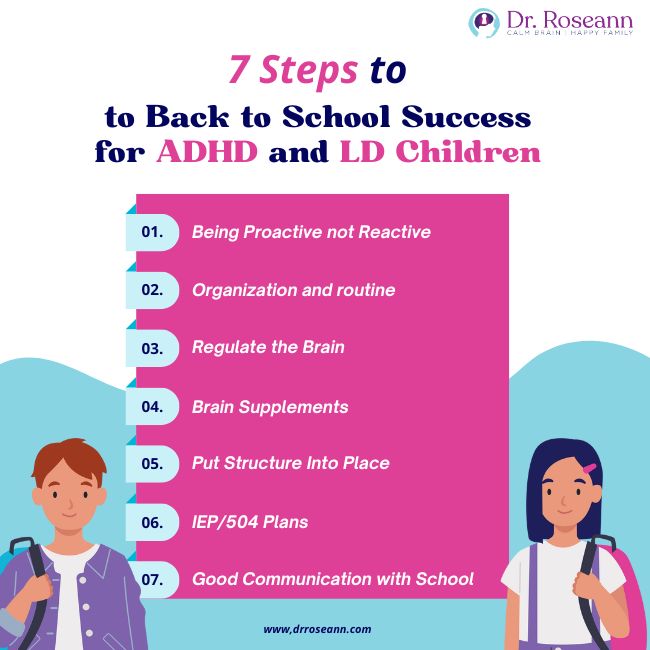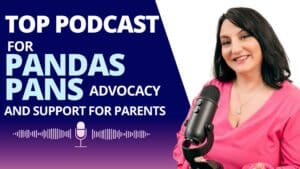The scent of fresh stationery and the buzz of a new academic year often evokes a mix of emotions. For many, it’s a combination of excitement, nostalgia, and the familiar butterflies.
For parents of children and teens with ADHD and learning disabilities (LD), this period is akin to watching their kids step onto a stage. But with the right strategies, the stage lights up, highlighting their capabilities and potential.

#1 Being Proactive not Reactive With Children’s Behavior
The value of preparation cannot be overstated. Remember those moments when we'd scramble last minute? By adopting a proactive mindset, parents can identify potential challenges in advance, making it easier to navigate the academic theater of diverse learning environments (DuPaul & Stoner, 2014).
Don’t wait for the thing you fear to happen and instead get ahead of it and put the right supports into place.
#2 Organization and Routine
There's comfort in consistency. Just as we find solace in our daily cup of coffee or our favorite morning routine, children with ADHD benefit immensely from structured routines (Dawson & Guare, 2018).
Allocate specific times for homework, breaks, and yes, those much-anticipated moments of playing their cherished video game or before spending time with friends.
#3 Regulate the Brain
Taking a stroll down memory lane, we remember our little tricks to grasp tricky concepts. Similarly, activities like exercise, meditation, and deep-breathing exercises can help our children tune into their tasks, assisting in concentration and focus (Halperin & Healey, 2011).
A calm brain is a brain that can focus better and handle stress.
#4 Brain Supplements
Just as we rely on our multivitamins for that daily boost, certain supplements might provide that extra edge for our kids (Sinn & Bryan, 2011).There are supplements that can support focus or calm anxious minds.
#5 Put Structure Into Place
That exhilarating feeling when earning a gold star or a pat on the back? Children with ADHD or learning issues cherish these moments of recognition. Using visual aids, timers, or apps can provide the structure they need, turning everyday tasks into moments of victory (DuPaul & Eckert, 1997).
#6 Look at IEP/504 Plans
The world of IEPs and 504 plans can be daunting. But, when decoded, they’re invaluable scripts tailored to ensure your child's performance shines (Yell, Katsiyannis, & Hazelkorn, 2007). It’s about giving them the stage that best suits their unique talents.
It is important to make sure your child’s school accommodation plan or IEP has what they need to be successful.
#7 Good Communication with School
Remember the satisfaction of having a heart-to-heart? It’s just as fulfilling when we have open channels with our child's teacher. Sharing triumphs, concerns, and milestones ensures that they’re not just educating a student but nurturing an evolving individual.
Having a Good School Year
By integrating both preparation and understanding, parents can ensure the spotlight remains on their child's growth, learning, and accomplishments throughout the academic year.
Keeping positive communication with your child’s team will ensure thing don’t slip through the cracks.
Citations
Cho, H., Wehmeyer, M., & Kingston, N. (2012). The Effect of Social and Classroom Ecological Factors on Promoting Self-Determination in Elementary School. Preventing school failure : alternative education for children and youth, 56(1), 19–28. https://doi.org/10.1080/1045988X.2010.548419
Dawson, P., & Guare, R. (2018). Smart but scattered: The revolutionary “executive skills” approach to helping kids reach their potential*. Guilford Press.
DuPaul, G. J., & Eckert, T. L. (1997). The effects of school-based interventions for attention deficit hyperactivity disorder: A meta-analysis. *School psychology review. https://psycnet.apa.org/record/1997-04328-001
DuPaul, G. J., & Stoner, G. (2014). ADHD in the schools: Assessment and intervention strategies. Guilford Press.
Halperin, J. M., & Healey, D. M. (2011). The influences of environmental enrichment, cognitive enhancement, and physical exercise on brain development: can we alter the developmental trajectory of ADHD?. Neuroscience and biobehavioral reviews, 35(3), 621–634. https://doi.org/10.1016/j.neubiorev.2010.07.006
Sinn, N., & Bryan, J. (2007). Effect of supplementation with polyunsaturated fatty acids and micronutrients on learning and behavior problems associated with child ADHD. Journal of developmental and behavioral pediatrics : JDBP, 28(2), 82–91. https://doi.org/10.1097/01.DBP.0000267558.88457.a5
Always remember… “Calm Brain, Happy Family™”
Are you looking for SOLUTIONS for your struggling child or teen?
Dr. Roseann and her team are all about solutions, so you are in the right place!
There are 3 ways to work with Dr. Roseann:
You can get her books for parents and professionals, including: It’s Gonna Be OK™: Proven Ways to Improve Your Child’s Mental Health, Teletherapy Toolkit™ and Brain Under Attack: A Resource For Parents and Caregivers of Children With PANS, PANDAS, and Autoimmune Encephalopathy.
If you are a business or organization that needs proactive guidance to support employee mental health or an organization looking for a brand representative, check out Dr. Roseann’s media page and professional speaking page to see how we can work together.
Dr. Roseann is a Children’s Mental Health Expert and Therapist who has been featured in/on hundreds of media outlets including, CBS, NBC, FOX News, PIX11 NYC, The New York Times, The Washington Post,, Business Insider, USA Today, CNET, Marth Stewart, and PARENTS. FORBES called her, “A thought leader in children’s mental health.”

She is the founder and director of The Global Institute of Children’s Mental Health and Dr. Roseann Capanna-Hodge. Dr. Roseann is a Board Certified Neurofeedback (BCN) Practitioner, a Board Member of the Northeast Region Biofeedback Society (NRBS), Certified Integrative Medicine Mental Health Provider (CMHIMP) and an Amen Clinic Certified Brain Health Coach. She is also a member of The International Lyme Disease and Associated Disease Society (ILADS), The American Psychological Association (APA), Anxiety and Depression Association of America (ADAA) National Association of School Psychologists (NASP), International OCD Foundation (IOCDF) International Society for Neurofeedback and Research (ISNR) and The Association of Applied Psychophysiology and Biofeedback (AAPB).
© Roseann-Capanna-Hodge, LLC 2023
Disclaimer: This article is not intended to give health advice and it is recommended to consult with a physician before beginning any new wellness regime. *The effectiveness of diagnosis and treatment vary by patient and condition. Dr. Roseann Capanna-Hodge, LLC does not guarantee certain results.













